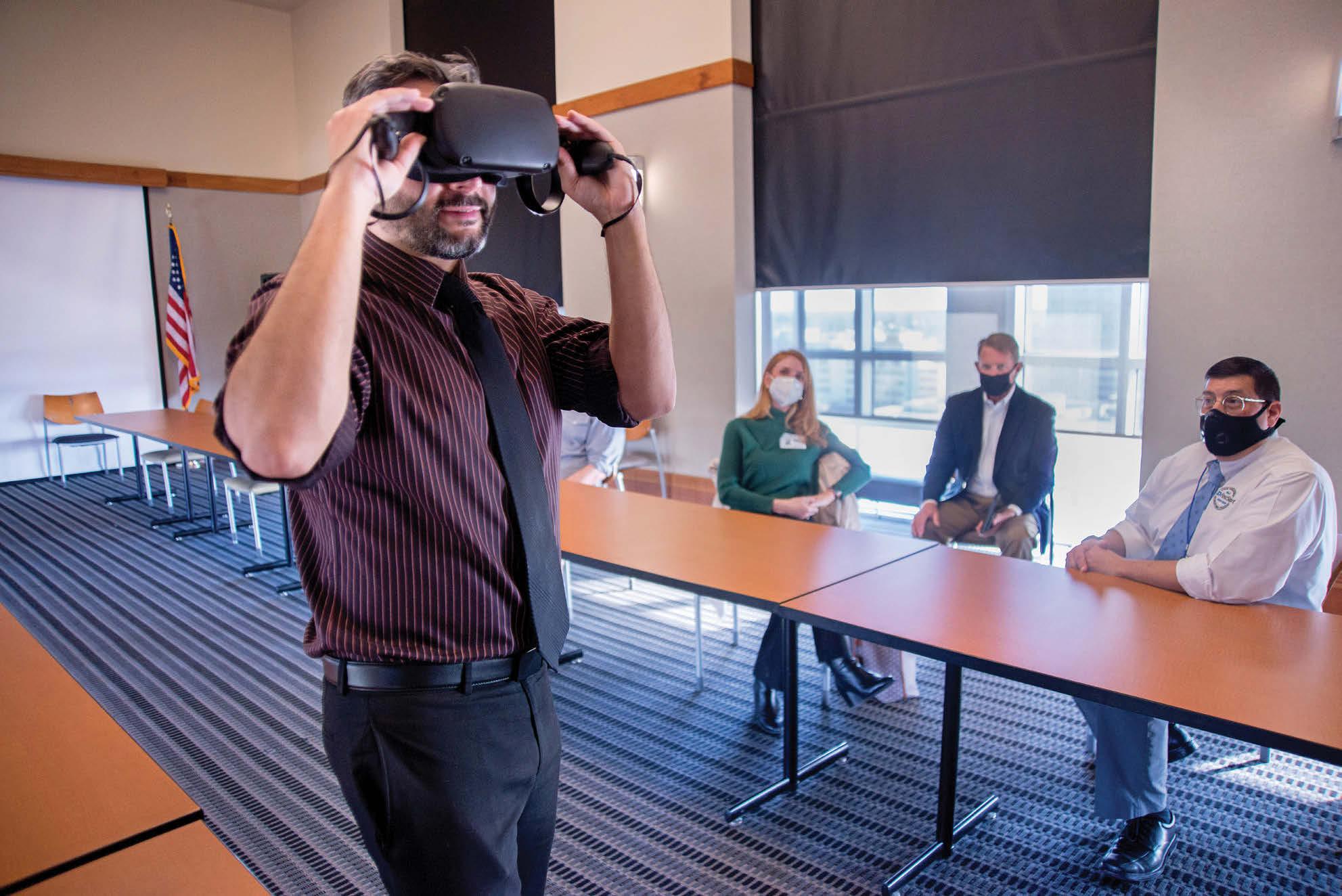
6 minute read
Random Thoughts
Steve Carter: A life well lived
JR BALL
WHAT DO YOU say when one of the kindest, funniest, most compassionate and incredibly generous humans to ever grace your life is suddenly gone?
It’s a question I’ve been struggling with since the early evening hours of Jan. 26 when a private text chain of some 20 people bound by a love for a husband, father, family member and friend shared the news none of us wanted to hear: Steve Carter now belongs to the angels.
Steve hadn’t been well for weeks and fought like hell in his final days to rally, but COVID-19 doesn’t care how many people you’ve impacted, how selflessly you’ve lived or how much joy you’ve spread. It cares even less about how much you’ll be missed. At its worst, this virus is an indiscriminate killer.
What bothers me as much as anything is the coronavirus reality of Steve spending so many of his final days in ICU isolation. This was not a man of solitude. He was at his best surrounded by an always-growing table of friends discussing life, pondering ways to make life better for Baton Rouge and Louisiana, planning the next low-cost spring training trip to Florida or to New York for the U.S. Open, or simply doing his damnedest to elicit a laugh.
Then again, there’s nothing fair about COVID-19 where the only thing that’s certain is the nightmare that was 2020 isn’t ending just because of a calendar change.
Thank goodness that his fantastic wife, Gloria, his beautiful children, Amelia and Solomon, and family members—especially Jim and Gladys Brown—as well as the great Dr. Carl Luikart, the wonderfully nice Bridger Eglin, an armada of heroic doctors and nurses and the dulcet tones of Neil Diamond were able to be with him in his final days.
The most important people in his life were there in the end. There’s comfort in that.
The history books will read that Steve Carter, before dying at the age of 77, was a three-term state representative, who chaired the Capital Region legislative delegation and worked hard to improve and reform education before running unsuccessful campaigns for state Senate and last year for mayor-president. The Baton Rouge native, Air Force veteran, LSU graduate and 1965 student body president, was a two-time captain of the Tigers’ tennis team and went on to coach the men’s team to the 1976 SEC title and the program’s first NCAA Tournament appearance in 1978. He later became an athletic administrator at LSU, rising as high as an associate athletic director before leaving the university in 1995.
Generations of children— many who are now leaders in our community—know Steve from the tennis camp he ran for years at LSU and then later at Southeastern Louisiana University.
That’s a lot of achievement and impact for a man who not only left us too early but was still searching for ways to make a difference before COVID-19 got the best of him.
But those decades of achievement hardly tell the story of Steve Carter.
This gracious man with mesmerizing blue eyes, a cherubic face, that devilish grin and a personality that could fill Tiger Stadium was a Pied Piper of living large, laughing through life in a minivan and collecting friends along the way.
His laugh—more of a cackle, really, that seemed to escalate in pitch the longer it went on—was infectious and warming.
He attracted an eclectic cast of characters that included bookies, Fortune 500 CEOs, world-class surgeons, bar owners, bank presidents, doctors, school administrators, tennis pros, golf hustlers, professional athletes, politicians, business owners, car dealers, lawyers, real estate agents, barbers, baristas, shoe salesmen and—to borrow one of his favorite phrases—“lip heads.”
Steve was a superior man who came off as an everyman. A man of wealth who lived a life of … well … cheapness. Who else would take pride in being able to take trips on less than $100 a day and demand one of this town’s most prominent executives sleep on the floor of a $35-a-night rural Tennessee motel because “it was stupid to spend $70 to sleep for three hours?”
Yet he was generous to a fault with his money, quietly opening his heart and his wallet to so many in need.
What made Steve so special was his capacity to see the best in people—and a willingness to forgive, no matter how deep the cut.
He would ask endless questions, seek consensus and go out of his way to avoid conflict, but one would be wrong— so wrong—to simply dismiss him as a lovable court jester. He was a tenacious competitor—ask anyone who played him in golf or tennis— with a titanium character and a burning desire to make life better for the Baton Rouge he loved so much.
I first met Steve when he was an LSU assistant athletic director in 1987. We became friends and briefly worked together running the Baton Rouge Bombers indoor soccer team in the late ‘90s. Yet it was over coffee where our relationship deepened—first at Coffee Call (while Gloria, her gracious twin Gladys and a cohort of friends, including the fabulous Janice Thomas, sat at a nearby table doing the morning Jumble in the newspaper), then later at CC’s Coffee House on Jefferson Highway. A coffee group that began as a duo at CC’s grew into a full orchestra of reprobates and VIPs, with Steve conducting it all six days a week.
The more meaningful and serious conversations took place over lunch, often at Phil’s Oyster Bar, Semolina’s, Albasha or most often Jay’s Bar-B-Q on Government Street. Usually with childhood friends Bridger Eglin and Richard Gill by his side, the four of us— and anyone else Steve knew who happened by—would discuss solutions to this community’s problems while dining on a “Turkey rich girl,” a bag of chips and an iced tea.
Some of the best people I know—and some of my dearest friends—came into my life through Steve and his family. The house on Longwood Drive where my children were born was the home built by his father and the one in which Steve spent much of his youth. Later when life got a bit more tumultuous, Steve and Gloria let me live for a short time in one of their homes in Jefferson Place rent free. They didn’t do it because of me, they did it because that’s just the type of people Gloria is … and, sadly, Steve was. Every year at Steve’s tennis camp he would tell what he called “The Blob Story.” In short, he would ask the campers if their goal was to be content going through life as little more than a nameless, faceless blob or were they going to be in that small percentage of the population who fights like hell to impact the world and make a difference?
Steve Carter was no blob. He more than made a wonderfully positive difference in this world, and those of us fortunate enough to call him family or friend are living a life so much better for it. Thank you for being my friend.









